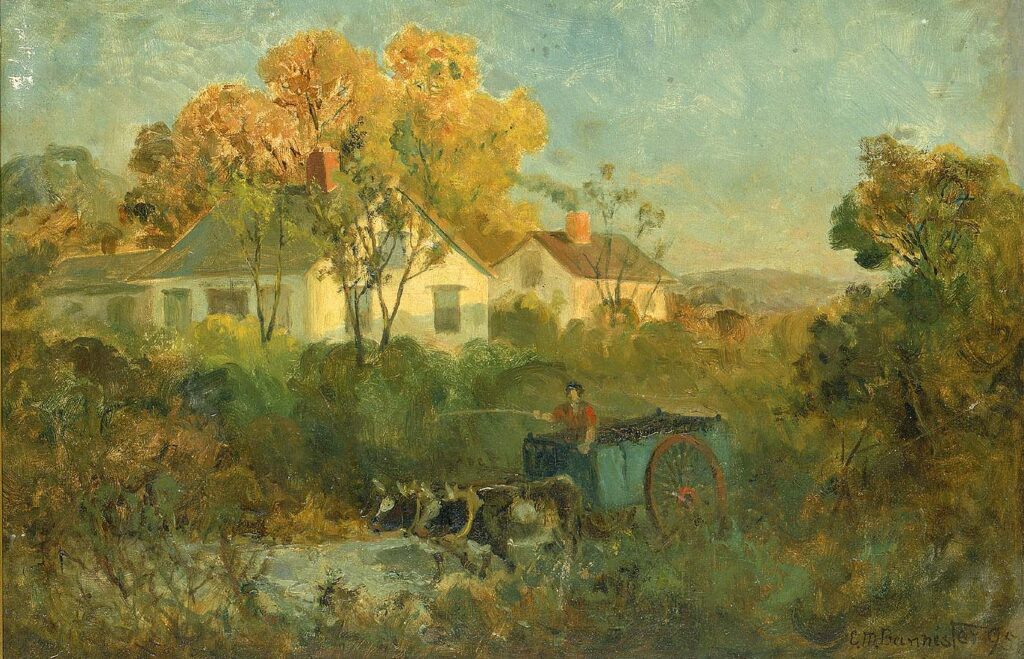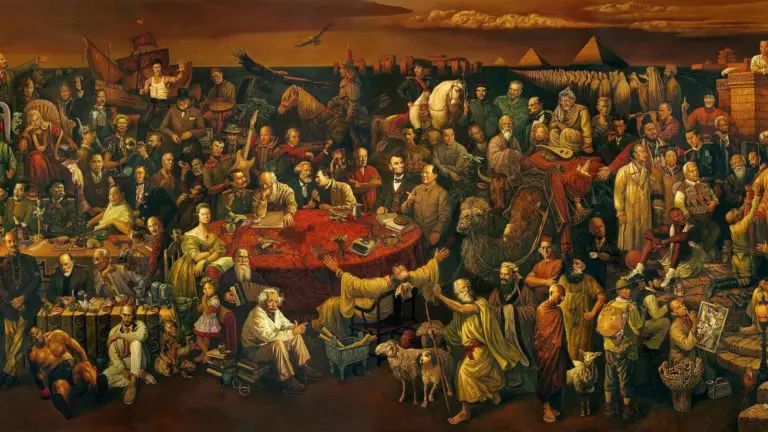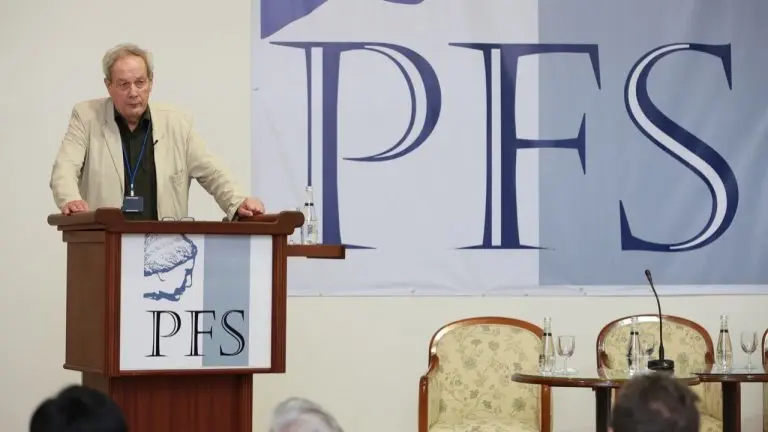At the age of 88, Wendell Berry is undoubtedly one of America’s greatest living writers. His canon includes more than two dozen volumes of poetry, nearly 40 works of non-fiction, and a record of the fictional Kentucky community of Port William, based on his hometown of Port Royal and detailed in 12 novels and dozens of short stories. Berry’s work has attracted a profusion of awards including the National Humanities Medal (awarded to him by President Barack Obama) and induction into the Kentucky Writers Hall of Fame. He writes his books in a little writing cabin in the forest fringing his Kentucky farm, and still resolutely rejects much of modern technology.
62 years after the publication of his first Port William novel, the 2022 publication of How It Went: Thirteen More Stories of the Port William Membership brings the saga of the small Kentucky community into the present day, narrated by farmer and agricultural reporter Andy Catlett (a character clearly modelled after Berry himself). All of Berry’s Port William stories feature the rich interior life of its membership as much as what takes place and where, but only an old man could have written How it Went. It features some of Berry’s best passages on the thickness of community rooted in place and the relationship between the land, the living, the dead, and the unborn:
Memories of times and places he had forgotten came back to him, reached him at last as if they had been on their way for a long time. He realized how fully and permanently mere glances, touches, passing words, from all his life far back into childhood, had taken place in his heart. Memories gathered to him then, memories of his own, memories of memories told and retold by his elders. The wealth of an intimate history, belonging equally to him and his ancestral place, welled up in him as from a deep spring, as if from some knowledge the dead had spoken to him in his sleep.
Having grown up with the King James Bible, the first thing I noticed when I began reading Berry’s Port William stories is how interwoven they are with its cadences. His intimate knowledge of this greatest of English Bibles would not have been remarkable when Nathan Coulter was published in 1960; now, one wonders how many readers actually recognize Berry’s references. The concept of “the membership” itself was described by Burley Coulter in Wild Birds this way: “The way we are, we are members of each other. All of us. Everything. The difference ain’t in who is a member and who is not, but in who knows it and who don’t.” Berry took that concept from 1 Corinthians 12: 12: “For as the body is one, and hath many members, and all the members of that one body, being many, are one body: so also is Christ.”
The phraseology of the King James is pervasive throughout the Port William record. Berry refers to “groaning and travailing” (Rom: 8) in A World Lost; he describes Andy’s amputated hand as a “help meet” that he misses like “Adam missed Paradise” in Remembering, and Elton Penn’s wife as a “help meet” in How It Went (Gen: 2); Hannah Coulter describes the membership as “those in whom we live and move and have our being” (Acts: 17). Those are just a few of many examples. And there is Berry’s haunting description of the flooded river in Jayber Crow, in which the titular character finds his thoughts shaped by the Scriptures he’d been weaned on:
And this is what it was like—the words were just right there in my mind, and I knew they were true: “the earth was without form, and void; and darkness was upon the face of the deep. And the Spirit of God moved upon the face of the waters.” I’m not sure that I can tell you what was happening to me then, or that I know even now. At the time I surely wasn’t trying to tell myself. But after all my years of reading in that book and hearing it read and believing and disbelieving it, I seemed to have wandered my way back to the beginning—not just of the book, but of the world—and all the rest was yet to come. I felt knowledge crawl over my skin.
As foreign as it is to the post-Christian reader, the consciousness and common parlance of the average American was once shaped by the King James Bible, which was a fundamental part of daily life for centuries. Even non-Christians—and there were plenty of those in Port William, too—would have recognized its phraseology without really noticing it because everyone did. It was the lens through which millions of Americans experienced life. Today’s largely illiterate generations do not know what they do not know. Reading Berry’s stories is a reminder, especially because he almost never quotes the Bible directly—his characters simply make use of its poetry and phrases because it is a part of the cultural air they breathe. Most people would have used passages of Scripture without being able to tell you where the text could be found or where they’d heard it first. Back then, they might have heard it anywhere.
Berry, of course, is nearly 90 and came of age in that culture. I wrote him a letter to ask if he was ever concerned that readers are losing not only the cultural context for his stories, but knowledge of that cultural context. Our current social imaginary, after all, is almost entirely devoid of Scripture. “The Bible is important to me,” he wrote back. “The King James Version is important to me because of its beauty, and because it was the Bible for every English-speaking reader for over 400 years. Most people now don’t know the Bible in any version, nor will they recognize other references to work in our literary tradition. That is a worry, of course, but there is no reason that my writing should be influenced by the ignorance of readers.” (To which the reviewer can only reply: Amen.)
It is not only biblical literacy that has vanished. In How It Went, Berry mourns the death of a self-contained civilization—a way of thinking, living, and being. Between the publication of his first Port William story and his last, the rise of the digital age has made the survival of this way of life if not impossible, then increasingly unlikely. Berry’s stories are rooted in a reality that most people have long turned away from in favor of the online world; reality today has become an acquired taste. In many of his stories not much actually happens aside from the high drama of what was once ordinary living. He describes the interior life of the Port William membership as they farm, fall in love, have children, lose loved ones, and struggle to survive as their culture dies. This sort of interior life is also vanishing in the maw of the digital matrix that makes a reflective existence impossible.
Berry has often been accused of lionizing rural life—of bathing the grimy hardships and dysfunctions of these communities in the warm glow of nostalgia. I don’t think that’s true. His stories include murders (in How It Went, Andy Catlett is still grappling with his Uncle Andrew’s killing), suicide, depression, alcoholism (Uncle Peach is a tragic figure ravaged by his addiction to drink and constantly in need of family help), and families shattered by misunderstanding and ugly conflicts. Berry’s descriptions of divorce are devastating, and his portrayal of the breakdown of Jack Beecham’s marriage in The Memory of Old Jack is, in my view, one of the best in American literature. But despite all that, Berry obviously loves this way of life without proviso or apology, and his portrayals are utterly lacking in condescension. That, in the current literary climate, may come off as sentimentality to some.
Port William is a thick community, with multiple ties that bind and many layers of collective understanding. Conservative blogger and author Rod Dreher, a Berry fan, noted that Tanya Berry once told him that she and Wendell didn’t understand why so many young conservatives loved his work but were grateful for it. Indeed, Berry has legions of conservative fans, and the reason is simple—it is because his work provides an answer to the question: What are we conserving? Or at least: What is worth conserving? Berry is advocating for islands in the sea of liquid modernity and roots in a restless, globalist world. The essence of Berry’s conservatism is the radical Christian love of neighbor, regardless of who they happen to be. One passage in Jayber Crow sums it up perfectly. Troy, Crow’s nemesis, is waiting his turn in the barber’s chair, opining to the other men on why communists should be rounded up and shot. Jayber stops cutting hair for a moment and quotes: “Love your enemies, bless them that curse you, do good to them that hate you.”
“Where did you get that crap?” Troy demands. “Jesus Christ,” Jayber responds. Troy falls silent, but Jayber is honest with himself: “It would have been a great moment in the history of Christianity, except that I did not love Troy.” There are many Christian conservatives today who seem to think that they can simply ignore the clear, inescapable biblical command to love both our neighbors and our enemies—even when they are one and the same. But Berry—and the Bible—are right, and they are wrong.
I hope these 13 stories are not the last of Wendell Berry’s record of the Port William membership. To me, his novels and his stories are a more effective evocation of the world he loves and wishes to defend than his nonfiction; as one friend put it to me: “His stories make me love what I should love and hate what I should hate.” His increasingly reflective stories, which are now more about the ruminations of old men than the lives of the young and strong, evoke a powerful nostalgia even in those who have never known the world that Berry writes about. Is all of that gone? Not quite, and not yet—and old men have hope when they see that not all have rejected the old ways. As Berry writes:
Andy and Danny are the last of a time gone. Perhaps, as they each secretly pray, they may be the first of a time yet to come, when Port William will be renewed, again settled and flourishing. They anyhow are the links between history and possibility, as they keep the old stories alive by telling them to their children and again, and whenever reminded, to each other.
In How It Went, Berry attempts once again to persuade us of something not only worth remembering, but preserving—but that only by remembering is preservation possible.





